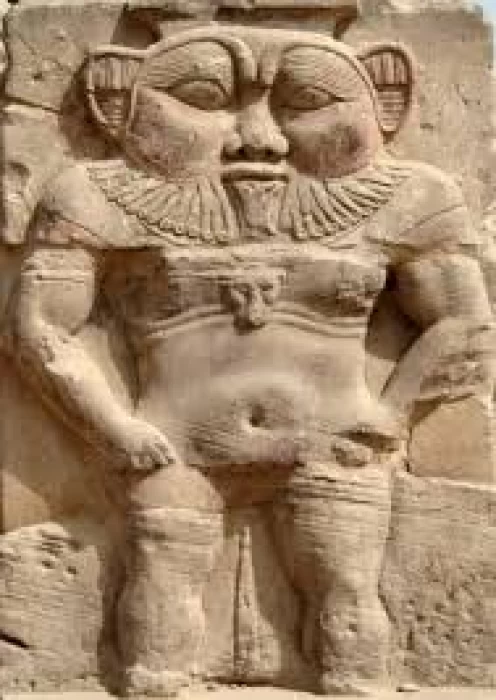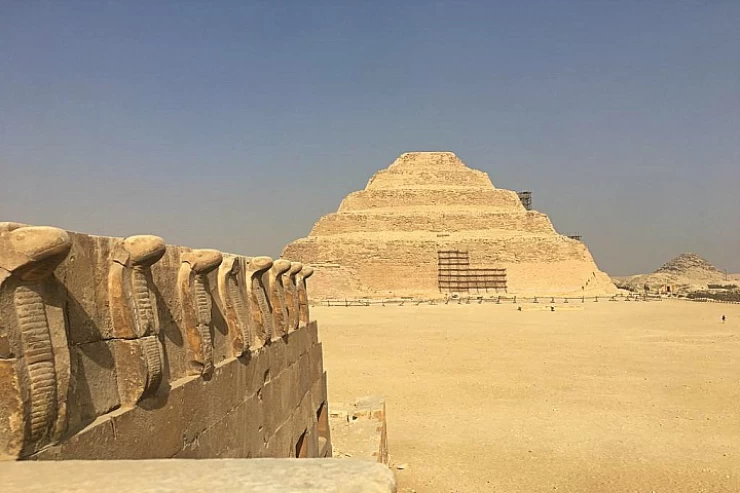
Dios Bes | Dios del parto | Dios enano egipcio antiguo
Dios Bes, es la única divinidad representada exclusivamente en perspectiva frontal, perteneció a una de las deidades menores del antiguo Egipto más admirables para el imaginario popular de los antiguos egipcios.
Bes, una divinidad con características demoníacas, es extrañamente una divinidad familiar. Bes fue un protector del hogar y de los niños, particularmente vinculado a la fase crítica del nacimiento y la defensa contra los animales dañinos. Este aspecto fue probablemente el más antiguo. La esfera de acción natural del dios Bes difundió su imagen sobre una amplia gama de objetos de la vida cotidiana de los antiguos egipcios desde los reposacabezas, en los que velaba por el sueño de los indefensos durmientes, hasta los objetos de cuidado personal.
Las relaciones de Bes con la danza y la música también fueron muy estrechas, con lo que alivió a las diosas enojadas. Las conexiones con el ciclo solar lo indican como una forma popular del dios solar.
Bes es un dios de hadas del antiguo Egipto, un ser compuesto, tanto deidad como guerrero satánico. Era un dios de la guerra, pero también un protector del parto y el hogar, y estaba vinculado con el deseo, el entretenimiento, la música y el baile. Aunque su papel originalmente parece haber sido el de la guardia del faraón, se hizo cada vez más famoso entre la gente común porque esencialmente protegía a mujeres y niños. No tenía un culto determinado, por lo que no había templos ni sacerdotes determinados en su nombre. Sin embargo, era uno de los más conocidos de los antiguos egipcios y generalmente estaba representado en artículos para el hogar.
Si planea visitar Egipto, debería considerar revisar nuestra guía de viaje detallada de Egipto, ya que es una experiencia única durante Viajes a Egipto que no se puede comparar con ninguna otra cosa que hacer en Egipto. Puede disfrutar de uno de los tours clásicos en Egipto, que a todos los viajeros les gustaría navegar por el río Nilo durante los tours navideños en Egipto o con el mejor clima durante los tours de Pascua en Egipto. Cubriendo la mayoría de las excursiones de un día a El Cairo, excursiones de un día a Luxor, además de las excursiones a Asuán, es por eso que nuestra sección de información de viaje está destinada a ser útil antes de continuar con las mejores excursiones de Egipto para aquellos que buscan cultura, historia de Egipto y alojamiento de lujo mientras navegan por el Nilo. Valle.
God Bes, is the only divinity represented exclusively in frontal perspective, it belonged to one of the minor deities in ancient Egypt most admirable to the popular imagination of the ancient Egyptians.
Bes, a divinity with demonic characteristics, is strangely a family divinity. Bes was a protector of the home and children, particularly linked to the critical phase of birth and the defense against harmful animals. This aspect was probably the most ancient. The natural sphere of action of the god Bes spread his image on a wide range of objects of the daily life of the ancient Egyptians from the headrests, in which he watched over the sleep of the helpless sleepers, to the personal care objects.
Bes's relations with dance and music were also very close, with which he relieved the angry goddesses. Connections with the solar cycle indicate it as a popular form of the solar god.
Bes is an ancient Egyptian fairy god, a composite being, both deity and satanic warrior. He was a god of war, but also a protector of childbirth and the home, and was associated with desire, entertainment, music, and dancing. Although his role originally appears to have been the pharaoh's guard, he increasingly became very famous among common people because he essentially protected women and children. He had no certain cult, so no temples or priests were established in his name. However, he was one of the most familiar of ancient Egyptians and was usually represented on household items.
The god "Bes" reflects an aspect of the ancient Egyptians' interest in fun and humor as a means of entertaining themselves in their daily lives, which were full of hard work and hardship.
The god "Bes" is the ancient Egyptian god of humor and fun. The ancient Egyptians chose for this god, humor, a form that provoked laughter and ridicule, as they formed him as a small dwarf with a full face and muscles, with his tongue sticking out of his mouth, combining the form of a human and a monkey, and his role was to bring joy to the king and the entourage in the royal councils
He only provided protection from danger, while at the same time warding off harm, and was able by his power to prevent evil according to the beliefs of the ancient Egyptians.
In critical circumstances he also appeased nature as told in the famous solar eye legend, when he stopped the wrath of the bloodthirsty goddess Hathor and offered her an alcoholic drink, with a plant-based drug added.
In a more specific field, it brought joy and had a certain regenerative importance that contributed to the achievement and happiness of family life in all aspects of procreation, from masculinity through fertility, to birth and growth. Protecting life and family also includes the healing powers of God only, both in terms of medical healing and magical purification.
The cult of Bes and the rituals surrounding its complex spiritual nature centered on different categories of ritual objects, maintaining certain stereotypical features with stylistic changes over several centuries.
Among these things, so-called vases played a major role. These vases are a class of ceramic vessels decorated with a doll or head, which spread in Egypt from the New Kingdom (16th to 11th centuries BC) to the Hellenistic or Ptolemaic era (330-30 BC) and the periods of the Roman Empire (30 BC). BC – 476 AD), when production peaked.
















